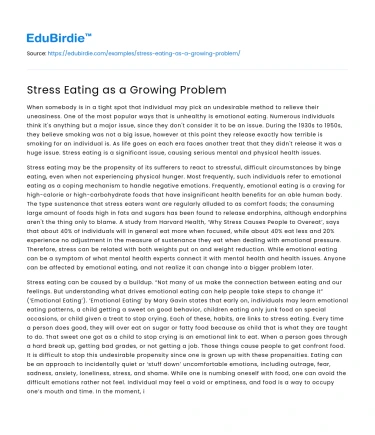Introduction
In contemporary society, characterized by rapid advancements and an ever-increasing pace of life, stress has become a ubiquitous component of daily existence. As individuals grapple with mounting pressures from work, personal relationships, and societal expectations, stress manifests in various ways, one of which is stress eating. This phenomenon, often referred to as emotional eating, involves the consumption of food—typically high-calorie, high-sugar, or high-fat items—as a coping mechanism to alleviate stress. While stress eating might offer temporary solace, it poses significant health risks, including obesity, cardiovascular diseases, and mental health disorders. According to a study by the American Psychological Association (APA), nearly 38% of adults admit to overeating or eating unhealthy foods due to stress at least once a week. This essay examines the causes and consequences of stress eating, explores potential counter-arguments, and ultimately underscores the need for effective strategies to combat this growing problem.
Understanding the Causes of Stress Eating
The etiology of stress eating is multifaceted, often rooted in a combination of psychological, physiological, and social factors. Psychologically, stress eating is often a response to negative emotions such as anxiety, sadness, or frustration. According to Heatherton and Baumeister's model of emotional regulation, individuals may use food as a means to distract themselves from distressing emotions, thereby temporarily boosting their mood. Physiologically, stress triggers the release of cortisol, a hormone that increases appetite and cravings for high-fat and high-sugar foods. This biological response is an evolutionary remnant from times when food scarcity was common, and calorically dense foods were essential for survival.
Save your time!
We can take care of your essay
- Proper editing and formatting
- Free revision, title page, and bibliography
- Flexible prices and money-back guarantee
Societal influences also play a crucial role in stress eating. In a culture that often equates food with comfort and celebration, individuals may turn to food for solace during stressful times. For instance, the prevalence of fast food and convenience stores enables easy access to unhealthy food options, exacerbating the propensity for stress eating. Furthermore, media and advertising perpetuate the association of food with emotional comfort, reinforcing this behavior. Despite these compelling factors, it is essential to consider alternative perspectives that suggest stress may not always lead to overeating. Some individuals, referred to as "stress under-eaters," may experience a decreased appetite in response to stress, illustrating the complex and individualized nature of stress responses.
The Consequences of Stress Eating on Health
The implications of stress eating extend beyond immediate emotional relief, posing long-term health risks that necessitate attention. One of the most prominent consequences is the contribution to overweight and obesity, conditions that are prevalent in many developed countries. The consumption of energy-dense foods in response to stress can lead to a positive energy balance, resulting in weight gain over time. According to the Centers for Disease Control and Prevention (CDC), obesity is linked to numerous health complications, including type 2 diabetes, hypertension, and certain types of cancer.
Beyond physical health, stress eating can adversely affect mental health. The guilt and shame associated with overeating can exacerbate feelings of depression and anxiety, creating a vicious cycle of emotional distress and eating. Moreover, the reliance on food as an emotional crutch can hinder the development of healthier coping mechanisms, leading to an over-reliance on eating as a primary means of stress management. It is imperative to acknowledge that not all individuals who engage in stress eating will experience these severe health outcomes. Some may have a higher metabolic rate or engage in physical activity that offsets caloric intake. Nevertheless, the potential risks underscore the importance of addressing stress eating as a public health concern.
Strategies to Mitigate Stress Eating
Addressing stress eating requires a multifaceted approach that encompasses psychological, behavioral, and environmental interventions. Cognitive-behavioral therapy (CBT) has been shown to be effective in helping individuals recognize and alter dysfunctional eating patterns. CBT focuses on changing the thought processes that lead to stress eating by promoting healthier ways to cope with stress. Mindfulness-based interventions, which encourage individuals to become more aware of their eating habits and emotional triggers, have also gained traction as a means to reduce stress eating.
On a broader scale, public health initiatives can play a vital role in mitigating stress eating. These may include educational campaigns that raise awareness about the health risks associated with stress eating and promote healthier food choices. Policy measures, such as regulating the marketing of unhealthy foods and improving the availability of nutritious options in schools and workplaces, are also crucial. Critics may argue that individual responsibility should be emphasized over systemic interventions. However, given the pervasive nature of stress and the ubiquity of unhealthy food options, collective efforts are necessary to create an environment conducive to healthier choices.
Conclusion
In conclusion, stress eating is a complex phenomenon that poses significant risks to both physical and mental health. While it may offer temporary relief from stress, the long-term consequences necessitate a strategic and comprehensive approach to intervention. By understanding the multifaceted causes of stress eating and implementing both individual and systemic strategies, it is possible to mitigate its impact and promote healthier coping mechanisms. As we continue to navigate an increasingly stressful world, prioritizing the development of effective interventions will be critical in addressing this growing public health concern. Ultimately, fostering an environment that supports mental well-being and healthy eating habits can lead to improved overall health outcomes and a better quality of life.






 Stuck on your essay?
Stuck on your essay?

